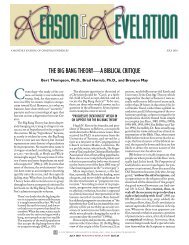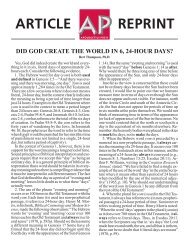The Many Faces, and Causes, of Unbelief - Apologetics Press
The Many Faces, and Causes, of Unbelief - Apologetics Press
The Many Faces, and Causes, of Unbelief - Apologetics Press
Create successful ePaper yourself
Turn your PDF publications into a flip-book with our unique Google optimized e-Paper software.
themselves be considered “evil.” Without countenancing<br />
mindless permissiveness or unbridled promiscuity,<br />
a civilized society should be a tolerant one.<br />
Short <strong>of</strong> harming others or compelling them to do<br />
likewise, individuals should be permitted to express<br />
their sexual proclivities <strong>and</strong> pursue their life-styles as<br />
they desire (Humanist Manifestos I & II, 1973, pp. 18<br />
19, emp. in orig.)<br />
It should come as no surprise, then, that “as man finds himself<br />
self-sufficient he will discard his religious convictions, or<br />
having none, he will fight those <strong>of</strong> others” (Smith, 1974, pp.<br />
152-153). <strong>The</strong> psalmist addressed this very point when he<br />
wrote: “<strong>The</strong> fool hath said in his heart, ‘<strong>The</strong>re is no God.’<br />
<strong>The</strong>y are corrupt, they have done abominable works;<br />
<strong>The</strong>re is none that doeth good” (14:1, emp. added).<br />
Some might object on the grounds that not all unbelievers<br />
lapse into moral decay. Bales addressed this objection in his<br />
book, How Can Ye Believe?<br />
First, men are sometimes glad to get away from the<br />
moral authority <strong>of</strong> the Christian faith not because they<br />
want to do some things that it forbids, but because<br />
some <strong>of</strong> the things which it sanctions <strong>and</strong> comm<strong>and</strong>s<br />
they do not want to do. Second, the sinful<br />
attitude <strong>of</strong> heart may not be <strong>of</strong> the type that we generally<br />
associate with immorality, but such as the pride<br />
<strong>of</strong> individuals who do not want to admit that they are<br />
a long way from what they ought to be. Such an individual<br />
may welcome unbelief because it removes from<br />
his sight the accusing high st<strong>and</strong>ard <strong>of</strong> the faith which<br />
passes judgment on his life.... Third, the collapse in<br />
moral conduct may not come immediately because...<br />
the habits <strong>of</strong> the individual <strong>and</strong> his attitudes have been<br />
constructed by Christian morality <strong>and</strong> he finds it difficult<br />
to break away from them <strong>and</strong> to get over the<br />
idea <strong>of</strong> the shamefulness <strong>of</strong> certain types <strong>of</strong> conduct....<br />
Fourth, it has not been suggested that this is the only<br />
cause <strong>of</strong> unbelief (1976, pp. 99,100, emp. added).<br />
-83

















